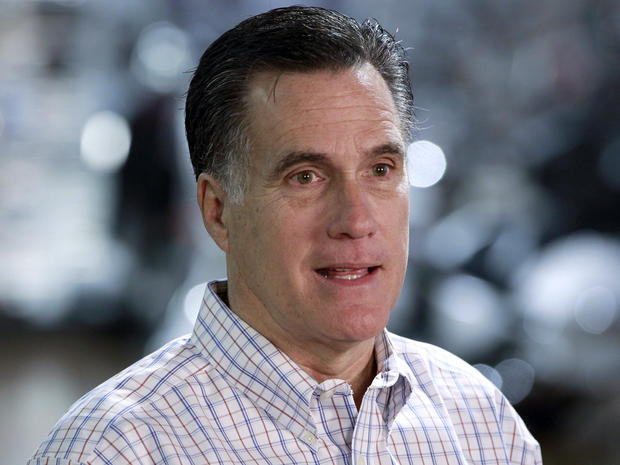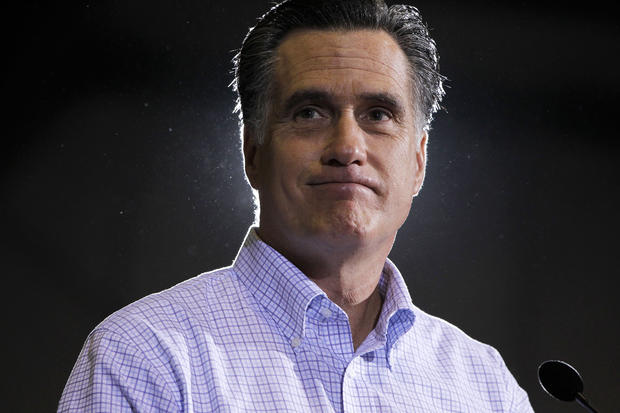Romney keeps playing right into critics' hands
Mitt Romney can't seem to help himself.
On Wednesday, the frontrunner for the Republican presidential nomination offered up the latest in a series of gaffes that play right into the hands of his detractors. Appearing on CNN, Romney said he is "not concerned about the very poor" - a comment that was immediately seized upon by both Republican rival Newt Gingrichand Democrats giddy at the prospect of another sound bite to use against Romney in the general election.
The full context makes clear that Romney's remarks weren't the callous dismissal of the very poor's plight that they first seem. He followed up the statement by saying, "We have a safety net there. If it needs a repair, I'll fix it." He also went on to say that he isn't concerned about the very rich, but that his focus was "the 90 to 95 percent of Americans who right now are struggling."
But as every politician knows, the full context doesn't much matter when Romney's opponents can take the "very poor" comment and make it the centerpiece of a context-free attack ad. For proof, look no further then another Massachusetts lawmaker, Sen. John Kerry, whose comment that he "actually did vote for the $87 billion [in Iraq war funding] before I voted against it" was used over and over in the 2004 presidential race to portray the then-Democratic presidential nominee as a flip-flopper.
For a candidate like Romney - a charter member of the one percent with a patrician bearing and Ivy League education - seeming relatable to the average American is inevitably going to be something of a challenge. He's not the first politician to struggle with this problem, of course: Barack Obama tried to overcome his professorial air in his 2008 presidential run by doing some bowling in Pennsylvania - only to put up a humiliating score of 37 through seven frames. It didn't help his cause.
But Romney has taken the self-sabotage to a whole new level. Romney has repeatedly offered up comments during this campaign that almost seem designed to reinforce the notion that his background and net worth - estimated at up to a quarter of a billion dollars - have left him living in a world unlike the one inhabited by the rest of us.
Let's run through some of the greatest hits. Last June, Romney quipped to a group of unemployed Floridians that "I'm almost unemployed" - a ludicrous and insensitive comment from a candidate whose tax returns showed an income of more than $40 million over the past two years, almost all from investment income. He followed that up in January by suggesting that "[t]here were a couple of times I wondered whether I was going to get a pink slip," a tough comment to swallow from a Harvard educated millionaire whose father was Michigan governor and CEO of American Motors Corporation. In September, meanwhile, he referred to himself as part of the "80 to 90 percent" of Americans in "the great middle class."
In August, Romney insisted that "corporations are people" - a comment that prompted mockery from Democrats who said it illustrates the fact that Romney and his party favor corporate interests over the struggling middle class. In October, he said it's a mistake to "try and stop the foreclosure process," saying it would be better to "let it run its course and hit bottom." That position might be defensible from an economic perspective, but it suggested Romney doesn't much care what happens to the millions of Americans facing foreclosure and financial ruin in the wake of the housing crisis.
Then there's Romney's decision to challenge Rick Perry in a December debate to a $10,000 bet. ("I'll tell you what, ten-thousand bucks? $10,000 bet?") Here, it was the figure that was tone deaf: It wasn't high enough to seem like a clear joke, which suggested that Romney is the sort of person for whom potentially losing $10,000 in an offhand wager isn't much of a big deal. (In truth, considering Romney's net worth, it isn't.) Just as memorably out of touch was his recent comment that the $374,327 he earned in speaking fees in 2010 reflected "not very much" money. And there's his response when asked if there are "fair questions about the distribution of wealth": "You know I think it's fine to talk about those things in quiet rooms."
The statement that most brings to mind the current controversy was Romney's comment in January that "I like being able to fire people who provide services to me." As with the "very poor" comment, that statement looks much better with the full context: Romney was talking about being able to switch from one health care provider to another if the first offers bad service. Which is fair enough - but why on earth would he be so careless as to put it quite that way?
Romney defended his "very poor" commentsby saying that "[s]ometimes things don't come out exactly the way you'd like them to." That's certainly true, and it's worth remembering that running for president is hard, in part because you have to do a lot of talking. It's almost inevitable that you will occasionally slip, particularly with reporters, bloggers and critics listening to every word in hopes that you say something that makes news or can be used against you.
But Romney isn't just slipping occasionally - when it comes to issues of wealth, employment and poverty, he's been a gaffe machine. And that has conservatives nervous. The "very poor" comment "reinforces the worst caricature of Republicans," conservative policy analyst Peter Wehner, who worked in the Reagan and George H.W. Bush administrations, wrote today. Rush Limbaugh agreed, saying, "[h]e makes himself a target with this stuff. He comes across at the prototypical rich Republican."
Romney can be a good politician, as he showed after his South Carolina loss, when he went on the offensive against Gingrich and bested him in two crucial debates ahead of the Florida primary. And if he is the nominee, he'll be facing a president who is particularly vulnerable because he is presiding over an economy that has yet to recover more than three years into his time in office.
But President Obama showed in the 2008 campaign that he is a great politician - probably one of the three best in the past 30 years, along with Ronald Reagan and Bill Clinton - and Romney simply can't afford to keep making self-inflicted wounds if he wants to beat him in November.

